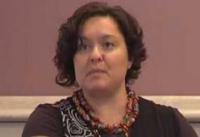One of the nation's most respected Aboriginal women - and a member of the Abbott Government's all powerful advisory council - has taken aim after another failed report card. Amy McQuire reports.
A member of the Abbott government’s handpicked Indigenous advisory body says governments will never make progress in “closing the gap” if they don’t move away from assimilationist policies and focus on evidence-based programs.
Professor Ngaire Brown is a doctor, a public health officer for the National Aboriginal Community Controlled Health Organisation (NAACHO) and a member of the Indigenous Advisory Council.
Today, Prime Minister Tony Abbott delivered the annual Closing the Gap report and expressed “profound disappointment” in his government’s failure to make progress of the targets determined by the Coalition of Australian Governments (COAG).
“Despite the concerted efforts of successive governments since the first report, we are not on track to achieve most of the targets,” Mr Abbott told the Parliament.
Mr Abbott told Parliament while there were “some improvements in education and health outcomes”, the government was behind on closing the gap in life expectancy in a generation, halving the gap in employment outcomes, ensuring early access to childhood education for all Indigenous four-year-olds in remote areas and halving the gap in reading and numeracy for Indigenous students.
It comes against a backdrop of more than $500 million cut from the Aboriginal affairs budget, and widespread funding uncertainty for Aboriginal organisations under the Abbott government’s shake up to Indigenous affairs – the Indigenous Advancement Strategy.
Dr Brown told New Matilda the government’s failure in closing the gap was not news for those who work in the sector.
“Disappointment is an emotive way to describe what has essentially been a failure of evidence-informed policy. We’ve known there have been these persistent and intergenerational disparities,” Dr Brown told New Matilda.
“We haven’t woken up this week and discovered it. We’ve made nowhere near enough progress in terms of eliminating the life expectancy gap and we’ve all been working on this for a very long time.”
Dr Brown said governments did not seize on the expertise within the Aboriginal community controlled health sector.
“Successive governments have failed to capitalise on the experience and expertise in this field, they’ve failed to understand the evidence. Rather they’ve used their ideology to inform policy, resourcing and service delivery.
“Of course it won’t be closer to what we may expect.”
Dr Brown said although she’s a realist, she’s also an optimist and “we have the financial capacity and ability to do this right”.
“But it’s very myopic planning. It’s all very short term.”
Dr Brown said that the Prime Minister’s rhetoric did nothing if it was not matched by action.
“The reality is we can all say the fabulous things we like, but unless there is action and commitment, and tangible responses to what you promise, there will be no difference.
“Saying ‘I’m committed to Aboriginal people and I’m going to help them’ is fantastic, but then removing resources from the most vulnerable sectors of our community - from cutting pensions, to removing incentives to early childhood development, to cutting money from the frontline, and not investing in primary prevention for chronic diseases - that speaks louder than anything.”
Dr Brown also acknowledged the high level of uncertainty and chaos across Aboriginal affairs stemming from the new model of funding deliveryin, known as the Indigenous Advancement Strategy (IAS).
“Every Aboriginal and Torres Strait Islander program is under review and there is uncertainty… it obviously creates confusion and anxiety.
“… People are unhappy and there is chaos and confusion. What we need to remember is we have to focus ourselves and take a strategic approach, and take solutions to the table.”
But she says governments have to act now to change the system, because ultimately it will be Aboriginal people who suffer.
“We need politicians to not only be listening, but also acting on what we know. What do they want their legacy to be? Do they want just another government that doesn’t get it right, or should the government make a bold move and change the system in response to Aboriginal mob and not try and assimilate us into a system that doesn’t work for us.
“…If they don’t change the way they do things, we’re the ones that are going to be punished for their incompetence.”


More Aboriginal news
Australia is now on the Human Rights Watch list | Indigenous population has slipped backwards in many areas | "Respect our dead, those whom you murdered" | Government ignores rampant discrimination in cities and towns | Call on WA government to stop funding 'failed' education programs | Return of Sydney Harbour island to Aborigines a 'unique opportunity' for reconciliation | Government members walk out of parliament when Opposition leader criticises under-spending on Aborigines | Jail a badge of honour for some Aborigines